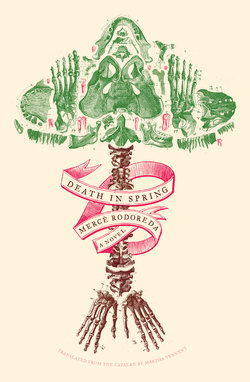Читать книгу Death in Spring - Mercè Rodoreda - Страница 9
На сайте Литреса книга снята с продажи.
ОглавлениеIII
At night you could hear groans beneath the beds; the sounds were coming from the river, as if the earth were groaning, on the point of carrying everything away, as if everything would vanish with the water. But it didn’t. The village remained, and only the water slipped secretly away. It was calm when it first arrived, but then turned wild with foam because it had dwelt so long in the dark. As though it had been frightened by being locked up for so long. I would sleep, and before falling asleep, or when I slept without sleeping, I used to think about things. I remembered my mother, without wanting to remember: straight and thin, with a red streak in her eyes. She used to beat children and spoil wedding nights. She would stand outside the newlyweds’ window on their wedding night, howling like a dog until the sickly morning light finally silenced her. No one paid any attention to mother’s howls, because she explained that her mother’s mother had done the same, as did all the women on her side of the family. Like lightning, she would bolt out of the house as soon as the newlyweds closed themselves inside, and she would begin to yell and yell with her twisted mouth. When mother was dead and had been buried for some time, I—I alone—heard her crying out beneath my father’s window the first day he and my stepmother slept together. It lasted until the first taste of light appeared.
One of my stepmother’s arms was much shorter than the other. Before I fell asleep I would think about my stepmother’s little arm, and I thought about the empty star in the cupboard where they locked me when they went to dance and laugh at funerals. I thought about the crimson powder and the cloud of souls and the tiny, reddish-purple heather that bloomed in autumn all across Maraldina. I thought about the sacks that bumped against the walls as we climbed out of the cave. The old men from the village, from the slaughterhouse, would come to the house when father was working in the fields. They brought things with them, and my stepmother would say to me: go help your father. And I would go, but when I would turn back to look at the house, it seemed to me that all around it wisteria roots were forcing it upward. I would walk along, kicking the dust, stopping at times to throw a stone at a lizard to cut off its tail, and then I would watch the tail trying to live, alone and desperate, until it became unbearable.
When I got out of the water I was fascinated by the sulphur dust that came from the marriage of flowers. A patch of it floated in a corner of the water. The sun was so strong that it made the blue round it less blue. Some sleeping fog broke up above the dog rose. When I had finished planting the grass, I thought again about Senyor’s house. I could see the side of it, the side without windows. It was topped by a spire. I could see Senyor, in my thoughts, coughing and eating honey, waiting always for the river to carry away the village. The ivy, high on the rock, was green. From time to time two men with long canes would thrash the new sprouts that wanted to creep up the house. The shredded leaves would fall down the cliff, their tender blades and little hands uprooted, down, down to the roofs and courtyards. The ivy had to be cut back or it would devour the walls. Every time one of the men struck furiously with his cane, causing bits of leaves to fall, Senyor leaned out and looked down, his hands resting on the windowsill.
